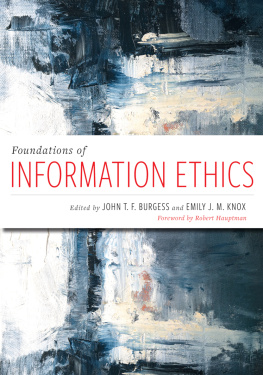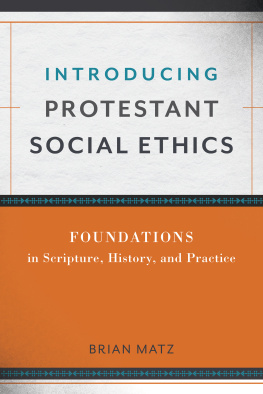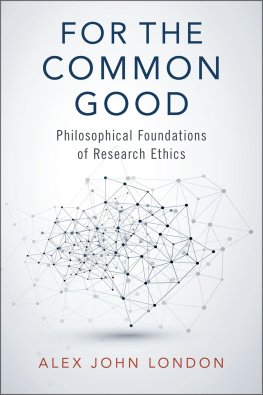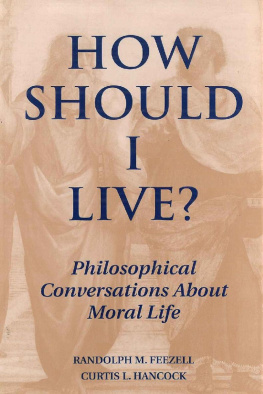Burgess John T. F. - Foundations of Information Ethics
Here you can read online Burgess John T. F. - Foundations of Information Ethics full text of the book (entire story) in english for free. Download pdf and epub, get meaning, cover and reviews about this ebook. publisher: American Library Association, genre: Romance novel. Description of the work, (preface) as well as reviews are available. Best literature library LitArk.com created for fans of good reading and offers a wide selection of genres:
Romance novel
Science fiction
Adventure
Detective
Science
History
Home and family
Prose
Art
Politics
Computer
Non-fiction
Religion
Business
Children
Humor
Choose a favorite category and find really read worthwhile books. Enjoy immersion in the world of imagination, feel the emotions of the characters or learn something new for yourself, make an fascinating discovery.
- Book:Foundations of Information Ethics
- Author:
- Publisher:American Library Association
- Genre:
- Rating:4 / 5
- Favourites:Add to favourites
- Your mark:
- 80
- 1
- 2
- 3
- 4
- 5
Foundations of Information Ethics: summary, description and annotation
We offer to read an annotation, description, summary or preface (depends on what the author of the book "Foundations of Information Ethics" wrote himself). If you haven't found the necessary information about the book — write in the comments, we will try to find it.
Foundations of Information Ethics — read online for free the complete book (whole text) full work
Below is the text of the book, divided by pages. System saving the place of the last page read, allows you to conveniently read the book "Foundations of Information Ethics" online for free, without having to search again every time where you left off. Put a bookmark, and you can go to the page where you finished reading at any time.
Font size:
Interval:
Bookmark:
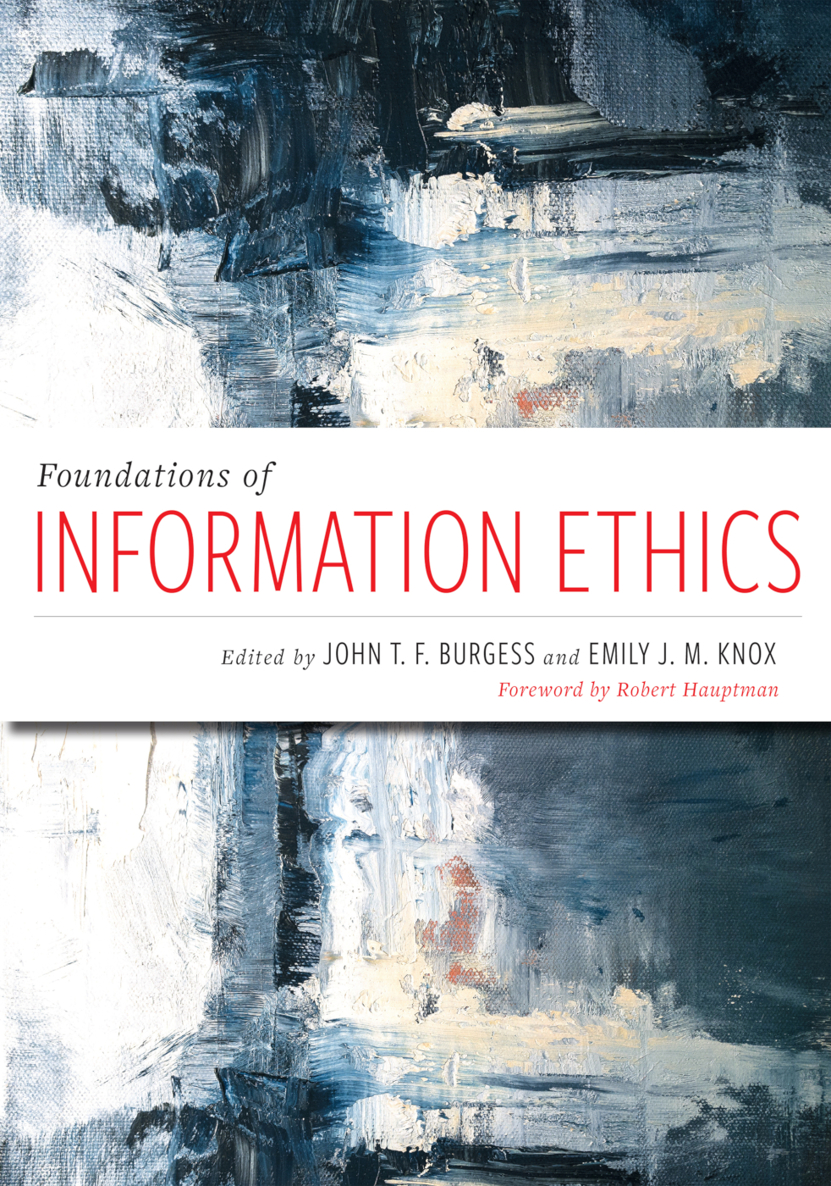
ALA Neal-Schuman purchases fund advocacy, awareness, and accreditation programs for library professionals worldwide.
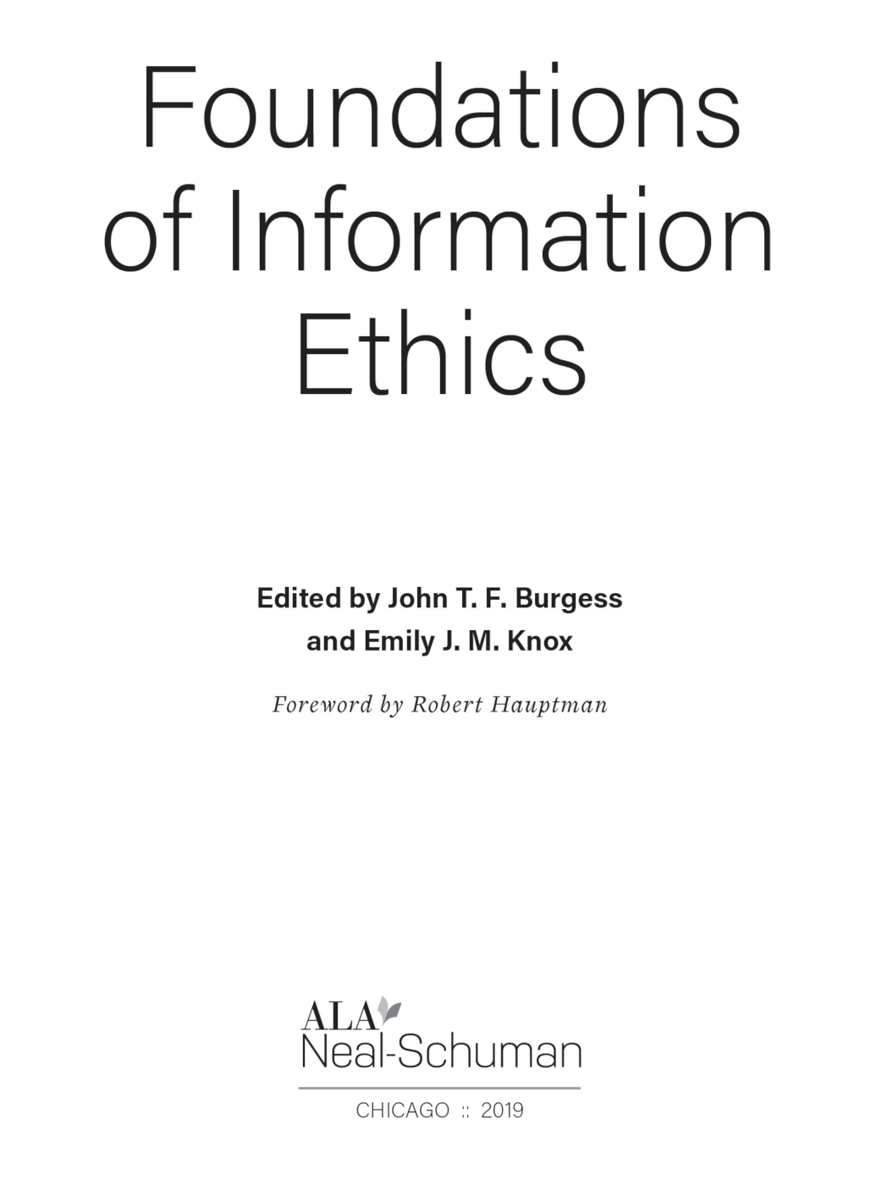
2019 by the American Library Association
Extensive effort has gone into ensuring the reliability of the information in this book; however, the publisher makes no warranty, express or implied, with respect to the material contained herein.
ISBNs
9780838917220 (paper)
9780838918500 (PDF)
9780838918494 (ePub)
9780838918517 (Kindle)
Library of Congress Cataloging-in-Publication Data
Names: Burgess, John T. F., editor. | Knox, Emily, 1976 editor.
Title: Foundations of information ethics / edited by John T.F. Burgess and Emily J.M. Knox ; foreword by Robert Hauptman.
Description: Chicago : ALA Neal-Schuman, 2019. | Includes bibliographical references.
Identifiers: LCCN 2018053595 | ISBN 9780838917220 (paper: alk. paper) | ISBN 9780838918494 (epub) | ISBN 9780838918500 (pdf) | ISBN 9780838918517 (Kindle)
Subjects: LCSH: Information technologyMoral and ethical aspects. | Information scienceMoral and ethical aspects.
Classification: LCC QA76.9.M65 F68 2019 | DDC 175dc23 LC record available at https://lccn.loc.gov/2018053595
Cover design by Kim Thornton. Cover image Will/Adobe Stock.
John T. F. Burgess
Paul T. Jaeger, Ursula Gorham, and Natalie Greene Taylor
John T. F. Burgess
Emily J. M. Knox
Michael Zimmer
John M. Budd
Kathrine Andrews Henderson
Peter Darch
Jane Blanken-Webb, Imani Palmer, Roy H. Campbell, Nicholas C. Burbules, and Masooda Bashir
Rachel Fischer and Erin Klazar
Margaret Zimmerman
Amelia Gibson
Robert Hauptman
T hings have changed dramatically since I first used the term information ethics (IE) thirty years ago and subsequently founded the Journal of Information Ethics. The concept caught on slowly, first in library and information science and then in other disciplines. A few of us massaged and propagated it at conferences and workshops and in publications. And I scrupulously followed its development and evolution by monitoring journals and citation indices. Quite early, Martha Montague Smith decided to return to school to earn a second doctorate; she wrote the first dissertation on IE (at the University of North Carolina) and I served as the outside reader. One might say that eventually things exploded and IE could be found almost everywhere. A Google search for the precise term information ethics brings up 202,0000 hits and, amazingly, there are 620 YouTube videos available on the subject. This is all to the good, I think, because an ethical attitude to the production, dissemination, storage, access, and retrieval of information and data is beneficial and necessary to a well-functioning information society; this is affirmed by crisis after crisis concerning false news, fake facts, social media privacy invasions, and everything else.
Scholars have written about IE at great length, but surprisingly there have been very few monographic treatments (and some books that include the phrase in their titles may not home in precisely on the topic). Even my own recent study will not appear until 2019. Therefore, it is a wonderful occasion to celebrate the publication of Foundations of Information Ethics, which offers twelve chapters, some conceptual in nature (see Burgess, ) on privacy, cybersecurity, or human rights, for example, that are subsets of information ethics.
In lays out an array of emerging issues so diverse and so pressing that one reels in fear: ethical problems with algorithmic bias, social media, marketing, fake news, open data, 3-D printing, AI, and health data ownership.
In other chapters, we learn that increasingly, a central aspect of human rights is information, and that it is more accurate to say that there is not a digital divide but many digital divides along economic, geographic, technical infrastructure, skills, gender, race, income, and other lines of separation. (Big) data presents innumerable, sometimes insurmountable ethical problems, but at the same time, researchers in cybersecurity lack agreement upon common ethical principles and some remain unconvinced of the possibility of establishing a universal framework that can address the realm of cybersecurity at all. Cognitive justice insists that different forms of knowledge... [are] equal to other forms of knowledge... [and have] the right to exist, and therefore all forms of knowledge are valid and should co-exist in a dialogic relationship to each other. And we learn many other things.
A similar structure in many of the chapters lends an additional layer of continuity. Sections present continuing issues and concerns, case studies, primary source materials, and further reading, and may supplement the lists of references.
The extreme diversity of these chapters offers the reader an opportunity to survey the entire IE field and come away with a replete understanding of where we stand and where we must go to avoid the pitfalls that currently stalk us, whether we reside in the US, Western Europe, Russia, China, or Botswana. The global informational world is unbounded. We are all part of a single whole and should act with responsible ethical commitment to avoid censorious, disinformational, invasive, demagogic, or totalitarian control.
I n January 2016, at the annual meeting of the Association for Library and Information Science Education, the Information Ethics Special Interest Group celebrated the tenth anniversary of the special interest groups (SIGs) formation. The occasion was marked by a session convened by the editors of this volume as an opportunity to reflect on the SIGs 2007 Position Statement on Information Ethics in LIS Education and to look forward to the next decade of SIG activities. Out of that meeting came a broad consensus among those who taught information ethics coursework that there was a need for a work to supplement existing professional ethics texts by articulating the intellectual underpinnings of the information ethics discipline. This volume was conceived as a direct response to that consensus.
Beyond the information ethics education community, there is also a need for greater understanding of the ethical dimensions of information systems and technologies. News broadcasts, social network posts, and everyday conversation increasingly turn to questions that are relevant to information ethics researchers: Are healthy discourses possible online? What is expertise and which experts should we trust? How much privacy should we be expected to give up in exchange for access to services? What are the appropriate limits when protecting intellectual property? And so on. All too often, public discussions of these topics come down to expressions of personal preferences or are subject to argument through identification. This is when, upon learning what position a group with whom one identifies holds, one begins to uphold and defend that groups position. Questions prompted by emerging information technologies, and the uses of those technologies, are often complex, nuanced, and difficult to resolve satisfactorily through reductive arguments, leaving the market to decide what is permissible instead of reasoned consensus. These chapters were selected to provide the terminology, frameworks, and principles needed to participate in these important conversations in deliberate and constructive ways.
Next pageFont size:
Interval:
Bookmark:
Similar books «Foundations of Information Ethics»
Look at similar books to Foundations of Information Ethics. We have selected literature similar in name and meaning in the hope of providing readers with more options to find new, interesting, not yet read works.
Discussion, reviews of the book Foundations of Information Ethics and just readers' own opinions. Leave your comments, write what you think about the work, its meaning or the main characters. Specify what exactly you liked and what you didn't like, and why you think so.

